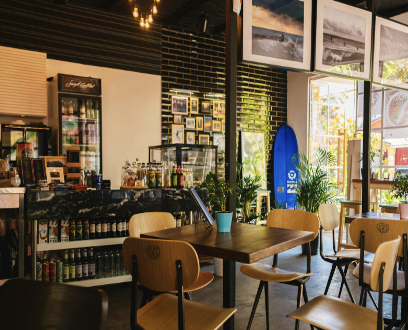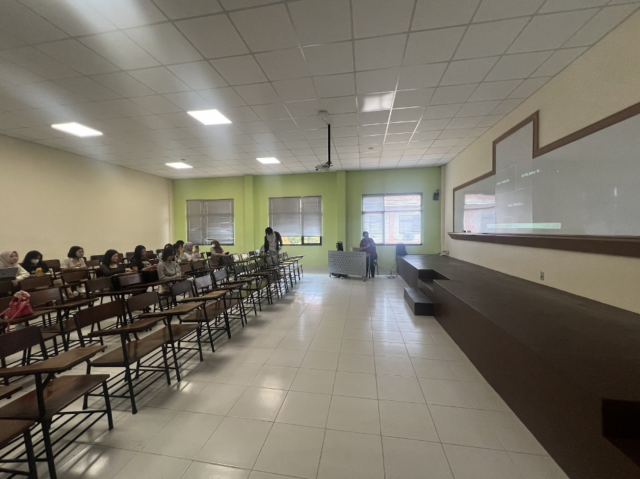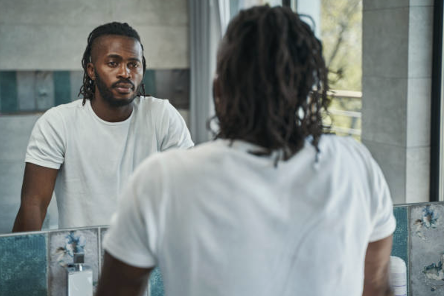A Look Inside LB64’s ‘Personality II’ Class
The course ‘Personality II’ is a class where students are equipped with insights related to human personality and various theories about it. As for the LB64 class, it is held on Tuesdays, from 11:20 AM to 1:00 PM by their lecturer Dr. Esther Widhi Andangsari, M.Si., Psi. The learning activities begin with the lecturer sharing little facts or ‘For Your Information’ (FYI), followed by a fun and chill Kahoot session, a starting point discussion, learning using videos as media, and an assignment in the form of film analysis.
 To start the class, the FYI presented is, of course, related to the course or study program. This time, the lecturer shared that individuals who are interested in or working in the field of psychology can apply their knowledge to entrepreneurship. In other words, psychology enthusiasts can become good entrepreneurs. An example would be people who open cafes with a mission to reduce customer stress and anxiety. They implement this by creating menu items with names like “Stress-relieving cinnamon roll” or by arranging the cafe space to be comfortable and not crowded.
To start the class, the FYI presented is, of course, related to the course or study program. This time, the lecturer shared that individuals who are interested in or working in the field of psychology can apply their knowledge to entrepreneurship. In other words, psychology enthusiasts can become good entrepreneurs. An example would be people who open cafes with a mission to reduce customer stress and anxiety. They implement this by creating menu items with names like “Stress-relieving cinnamon roll” or by arranging the cafe space to be comfortable and not crowded.
After successfully capturing the students’ attention, the lecturer continued with a review of the previous week’s material. This was done by taking a quiz through Kahoot, containing questions about the previous topic, namely “Maslow’s Holistic Dynamic Theory.” To ease the students’ tension, the quiz was not graded or mandatory, but simply offered to add extra points for students. Next, the lecturer discussed the starting point. The starting point itself is a forum that students must fill out before class begins, which contains general questions related to the topic to be studied that day.
Since the topic of the class was “Person-Centred Theory” by Rogers, the lecturer asked the students how their ideal self appeared—whether their ideal self was similar to how they currently perceive themselves. The Person-Centred Theory is a theory where Rogers focuses only on what humans need, unrelated to the unconscious or conscious mind. This theory believes that every individual has the ability to achieve self-actualization—the tendency to actualize oneself asperceived in consciousness. In this theory, Rogers separates two subsystems: the self-concept and the ideal self. The self-concept encompasses all aspects of the self and experiences that are perceived by the individual in consciousness (“I am not beautiful,” “I am beautiful”). Meanwhile, the ideal self is one’s view of how they want to appear or be (“I want to be beautiful”). If a person’s self-concept aligns with their ideal self, it means the individual has achieved self-actualization—this phenomenon is called congruence. Conversely, if there is a significant gap between the ideal self and the self-concept, this phenomenon is called incongruence and indicates an unhealthy personality.
To achieve self-actualization, being in an environment filled with unconditional positive regard—being loved unconditionally, empathy, and congruence—can greatly support and help.
After the material has finished being discussed, the lecturer closed the class by showing a trailer from a film titled ‘Imperfect’ and directed students to analyse the film and express their opinions about the congruence and incongruence of the main character. Assignments like this can both entertain students and educate them, making the course feel less heavy and boring.
The lecturer’s approach made the class feel relaxed and not boring, as the lecturer continuously engaged with the students, sometimes joking with them or asking for their opinions. The language used was Indonesian, but some learning media, such as video learning and textbooks, were in English to hone students’ multilingual skills. The class took place in a comfortable room, with air conditioning, windows to prevent stuffiness and darkness, chairs and desks that could accommodate all students, a microphone for communicating with students learning via Zoom, and a projector that worked smoothly and well for presenting the material.
Writer: Farawayne Dila Dinevali Sinurat




Comments :